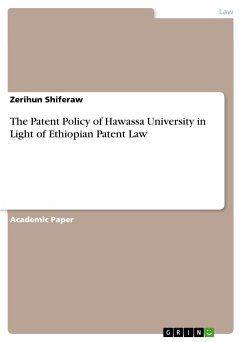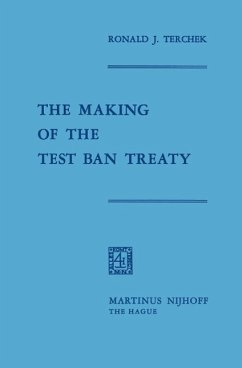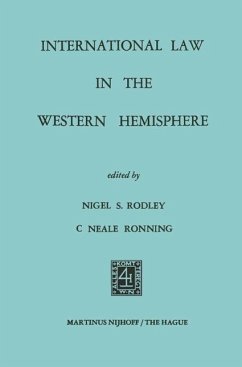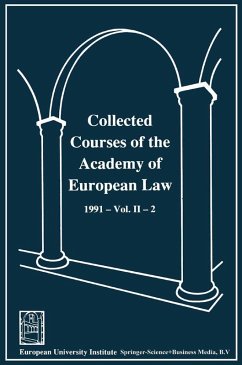
The Patent Policy of Hawassa University in Light of Ethiopian Patent Law (eBook, PDF)
Sofort per Download lieferbar
Statt: 17,95 €**
15,99 €
inkl. MwSt. und vom Verlag festgesetzt.
**Preis der gedruckten Ausgabe (Broschiertes Buch)
Alle Infos zum eBook verschenkenWeitere Ausgaben:

PAYBACK Punkte
0 °P sammeln!
Academic Paper from the year 2015 in the subject Law - European and International Law, Intellectual Properties, Hawassa University (Post Graduate Study), language: English, abstract: A patent is a monopoly right granted by the government through the patent office to an individual who has invented a product or process. The basic objectives for granting this right are to inform the public through the publication of details from the application of the latest technological advances; to provide an incentive for innovation and thereby stimulate economic activity; and to provide a reward for creative...
Academic Paper from the year 2015 in the subject Law - European and International Law, Intellectual Properties, Hawassa University (Post Graduate Study), language: English, abstract: A patent is a monopoly right granted by the government through the patent office to an individual who has invented a product or process. The basic objectives for granting this right are to inform the public through the publication of details from the application of the latest technological advances; to provide an incentive for innovation and thereby stimulate economic activity; and to provide a reward for creative and innovative effort. Universities move their knowledge and discoveries to the general public in different ways, and one is relationships with industry. The inventions discovered by the researchers at the universities may be patented and licensed to the industry and the proceeds of it may be used for further research to solve the problems of the public. This necessitates universities to hold patent policy and guidelines thus; this research assessed the necessity of the patent policy of Hawassa University in light of Ethiopian patent law. It basically used a qualitative research method and assured the non-existence of an authoritative patent policy for the university, recommending the necessity of such an authoritative patent policy due to sound rationals to do so. The research also forwarded the policy directions to demarcate the relationship between the university and an inventor and that of industries as to the scope of the policy, ownership of the patent, procedure of patents, manner of funding the research, and the mechanism of sharing royalties. As it covered these essential points, the research may be used as a basic tool to have a well-developed patent policy for the university and for the furtherance of the research in the area.
Dieser Download kann aus rechtlichen Gründen nur mit Rechnungsadresse in A, B, BG, CY, CZ, D, DK, EW, E, FIN, F, GR, HR, H, IRL, I, LT, L, LR, M, NL, PL, P, R, S, SLO, SK ausgeliefert werden.













